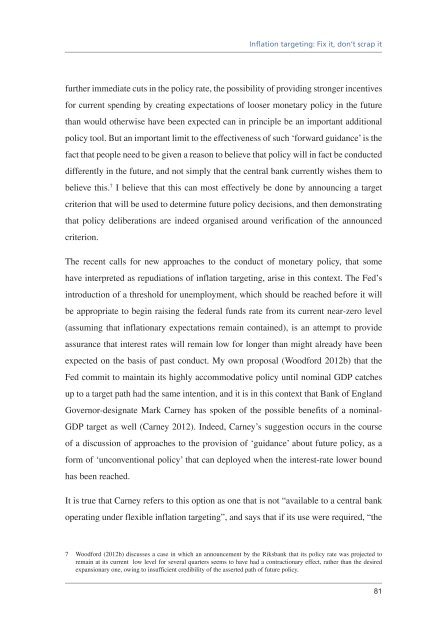Is inflation targeting dead? Central Banking After the Crisis - Vox
Is inflation targeting dead? Central Banking After the Crisis - Vox
Is inflation targeting dead? Central Banking After the Crisis - Vox
Create successful ePaper yourself
Turn your PDF publications into a flip-book with our unique Google optimized e-Paper software.
Inflation <strong>targeting</strong>: Fix it, don’t scrap itfur<strong>the</strong>r immediate cuts in <strong>the</strong> policy rate, <strong>the</strong> possibility of providing stronger incentivesfor current spending by creating expectations of looser monetary policy in <strong>the</strong> futurethan would o<strong>the</strong>rwise have been expected can in principle be an important additionalpolicy tool. But an important limit to <strong>the</strong> effectiveness of such ‘forward guidance’ is <strong>the</strong>fact that people need to be given a reason to believe that policy will in fact be conducteddifferently in <strong>the</strong> future, and not simply that <strong>the</strong> central bank currently wishes <strong>the</strong>m tobelieve this. 7 I believe that this can most effectively be done by announcing a targetcriterion that will be used to determine future policy decisions, and <strong>the</strong>n demonstratingthat policy deliberations are indeed organised around verification of <strong>the</strong> announcedcriterion.The recent calls for new approaches to <strong>the</strong> conduct of monetary policy, that somehave interpreted as repudiations of <strong>inflation</strong> <strong>targeting</strong>, arise in this context. The Fed’sintroduction of a threshold for unemployment, which should be reached before it willbe appropriate to begin raising <strong>the</strong> federal funds rate from its current near-zero level(assuming that <strong>inflation</strong>ary expectations remain contained), is an attempt to provideassurance that interest rates will remain low for longer than might already have beenexpected on <strong>the</strong> basis of past conduct. My own proposal (Woodford 2012b) that <strong>the</strong>Fed commit to maintain its highly accommodative policy until nominal GDP catchesup to a target path had <strong>the</strong> same intention, and it is in this context that Bank of EnglandGovernor-designate Mark Carney has spoken of <strong>the</strong> possible benefits of a nominal-GDP target as well (Carney 2012). Indeed, Carney’s suggestion occurs in <strong>the</strong> courseof a discussion of approaches to <strong>the</strong> provision of ‘guidance’ about future policy, as aform of ‘unconventional policy’ that can deployed when <strong>the</strong> interest-rate lower boundhas been reached.It is true that Carney refers to this option as one that is not “available to a central bankoperating under flexible <strong>inflation</strong> <strong>targeting</strong>”, and says that if its use were required, “<strong>the</strong>7 Woodford (2012b) discusses a case in which an announcement by <strong>the</strong> Riksbank that its policy rate was projected toremain at its current low level for several quarters seems to have had a contractionary effect, ra<strong>the</strong>r than <strong>the</strong> desiredexpansionary one, owing to insufficient credibility of <strong>the</strong> asserted path of future policy.81














